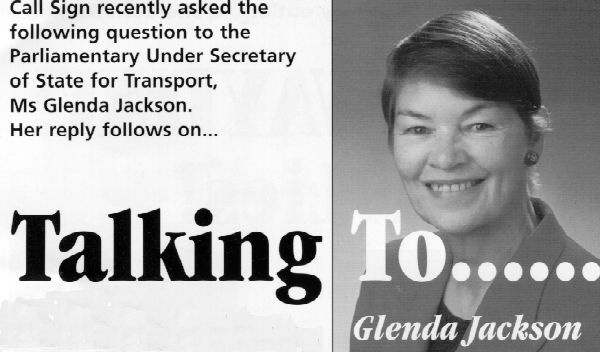
|
| CALL SIGN: At each Budget, mention is always made of Public Transport and the subsidies that are given to it. May I ask whether you consider the London Licensed taxi industry to be part of that Public Transport network? If the answer is ‘yes’, then why are we never given any subsidies and why is the price of the fuel we use (diesel) always raised in line with petrol? How much do bus companies pay for a gallon of diesel? If the answer is ‘yes’, then why is the cost of a new taxi not exempt from VAT? After all, by the turn of the century -and at our own cost - every licensed London taxi will be wheelchair accessible and as of this moment, some 80% already are. Surely that classifies for exemption? How many regular bus services take wheelchairs and in the unlikely event of them being converted, who would bear the cost? If the answer is ‘no’, why does the Transport Minister have power over us telling us what she wants to see and what she doesn’t want to see? Why does the House announce the yearly fare increase that never covers the annual fuel cost hike? Why can we not organise our own fare increase? Since your Government came to power, it has added something like 45p in tax onto the cost of a gallon of diesel. This, of course, is in addition to the excessive charges made by the fuel companies who were quick to put prices up when a barrel of crude oil went through the $40+ barrier but are reluctant to decrease it when prices drop dramatically as now. The |
average taxi driver’s fuel cost alone,
has now risen by aprox £50 per month. If, as I suspect, your answer is that we ARE part of the Public Transport system, then I think that now is the time to show some sort of commitment to this long established trade (over 300 years) and not consider buses and tubes to be the only participants in the capitals transport system. GLENDA JACKSON: |
supplied to a disabled person for his or
her, personal or domestic use. or to a charity serving the needs of disabled people,
or certain other bodies which pay for the goods wholly from charitable funds. This
means that a taxi owner may not buy a VAT-free wheelchair accessible taxi. Of course, a VAT registered taxi business can claim input tax on VAT incurred when it purchases a taxi. It is possible for taxi owners who are not registered for VAT, and who would otherwise have to bear it, voluntarily register for VAT. However, once voluntarily registered the business would have to pay VAT on the fares they charge. The pros and cons of this for an owner driver are not simple, and anyone considering registering for VAT should first consult their accountant. All new buses, like taxis, will have to be accessible in due course. We are at present consulting on the requirements and the timetable for implementation of these requirements. The cost of new buses is normally borne by the operator. New trains will also have to be accessible, too, and we will also be consulting on this shortly. Finally, I would point out that the cost of taxis, their maintenance and running costs, including the price of diesel, are assessed at the start of the year and are reflected in the formula agreed with the trade as a basis for London taxi fares for the coming 12 months. This was done earlier this year, and, as you know, London taxi fares were increased on 25 April. |
Powered by NetXPosure |
Copyright © 1998 Dial-A-Cab Ltd, All rights reserved.